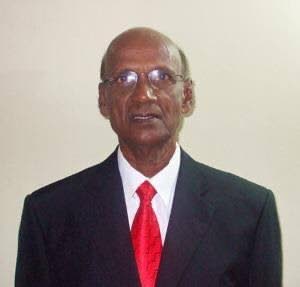Leadership in Caricom

DR ERROL N BENJAMIN
IT HAS become the fashion in Parliament and other official circles to scoff at the mention of good leadership in some of the other major Caricom countries when compared with ours, the disdain no doubt arising from the age-old mantra of “who doh like it could get to hell out of here,” coined by our founding father and immortalised in a calypso by the Mighty Sparrow with the typical double entendre of arrogant leadership and the underlying mockery and satire underpinning such, as only the great bard can do.
Such contempt not only presumes a kind of infallibility in leadership that scorns any objective criticism, but also carries with it the almost divine right to say and do whatever pleases such leadership, full in the assurance that no questions would be asked, with the tribe fully in support for the rewards to be had from such unquestioning loyalty.
But are some of the facts instructive enough to illustrate the rung we occupy on the ladder of effective leadership in the interest of the people when compared with other Caricom leaders? First there is Mia Mottley of Barbados and her initiative of taking a hard look at food and fuel prices (Guardian, June 20) within her own formulated social relationship as she participated in a panel discussion involving Deputy PM of Canada Chrystia Freeland and MD of the IMF Kristalina Georgieva on the theme, “Building Resilience and Sustainability in the Caribbean.”
Mottley focuses on “the importance of having policy and fiscal space so that government can continue to shield citizens during these tough times,” of which putting a cap on the rate of VAT is a first step. Significant in her planning is setting the deadline of July 8 after her meeting of labour, private sector and government, all part of her social partnership to “put ourselves in a position to take decisions that will help families in the country.”
Here Mottley locates all families, rich or poor, on the front burner, getting important stakeholders to join together within two weeks to work out specific proposals for family relief.
What do we have in contrast here in TT? A minister is also talking about helping families but only the “poor and vulnerable,” giving a social service for all an undeniable political bent, because what this would mean are the usual handouts and freeness without a comprehensive, sustainable plan of action to help the population as a whole.
Then there is our next-door neighbour Guyana, with an editorial in the Guardian of June 20 insisting that there is “critical need for the [Bharrat] Jagdeo Initiative,” suggesting that TT cannot work in isolation with its accustomed “grants and assistance” for “the poor today are in a much poorer state.” (The Jagdeo Initiative was brought to Caricom 20 years ago in 2002 but was allowed to collect dust on the shelf since then).
Instead, with the threat of global shortages because of the pandemic, TT must fall into line with the agreement reached at the Agri-Investment Forum of a month ago in Guyana, and with other Caribbean countries, not to merely tow the old line of supplying vegetables to one another by inter-island schooner, but consistent with the Jagdeo Initiative that Caribbean agriculture had to undergo “deep systemic and rapid transformation.”
Guyana has already taken a significant step in “redesigning regional transportation for the distribution of food products,” but what have we done in TT? Paying the usual lip service to agriculture, still wallowing in the illusion of being a gas and oil producer when, according to a business reporter, relying on oil and gas is as regressive a step as any with declining oil and gas production, ironically at a time when prices are the best.
Are we in position now to continue playing the politics of freeness while agriculture is allowed to wilt with mere words?
Mottley and Jagdeo reflect a leadership style that points to focusing on the problem, resorting to specific strategies within specific time frames in the interest of the people; Mottley in particular. Sheldon Waithe, in his article “Mottley’s idealistic angle” (Guardian, June 22), writes of her “daring podium pontifications…as exactly what is required to shake up a world that repeats the same processes and expects different outcomes,” idealistic as those pronouncements may be.
Lest we forget, remember the Guyana election debacle was on the brink of succeeding, were it not for the bold and timely intervention of Mottley as head of Caricom.
The Jagdeo Initiative is visionary in terms of a small group of islands, some with limited resources struggling to survive. And the leadership of Jamaica is also forward looking, pushing for private participation in national development. Which begs the question as to why a major Trinidad state-run company, now at the centre of a price controversy, should still be in the business of procuring, or an important highway project should still be run by the government of this country.
Leadership, first and foremost, is about character acting in the interest of the people, but realistically it is about policymaking that wins the approval of the electorate for the next round. As for us here in TT the issue of character poses many questions for the leadership, but the problem of winning the electorate does not really apply here as elsewhere, for here the vote of the tribe is sure, for them on both sides of the divide the “mess of pottage” for their unquestioning loyalty, and for the leadership, the luxury of not having to account no matter what they say or do.
Is it just, then, to scoff at the commendation given to leaders who are pointing to the way forward in their policymaking in the interests of the people?
As usual, I leave the answer to you.


Comments
"Leadership in Caricom"